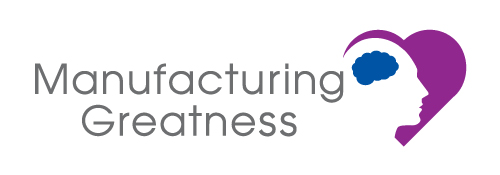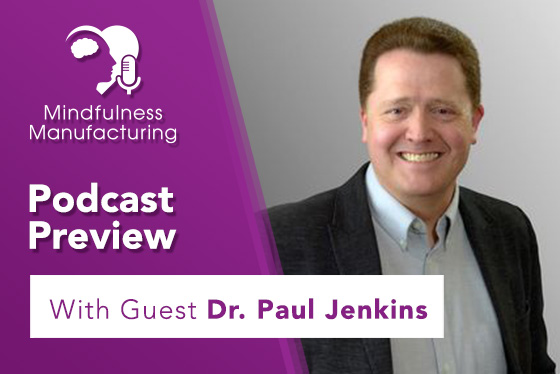More Than Positive Thinking: A Psychologist’s Lessons for Finding a Productive Approach to Positivity
“Just think positive!” We’ve all heard this saying dozens of times in our lives. It’s likely you’ve even said it yourself to a friend or coworker struggling with a challenge or setback. But is “just think positive!” really helpful, or is it nothing more than a trite motivational phase? Could we all benefit from shifting our approach on positivity?
These are the questions I discussed recently on the Mindfulness Manufacturing podcast with guest Dr. Paul Jenkins. On top of being a coach, speaker, and author, Dr. Paul is also a professional psychologist who specializes in the science and practice of positivity. In his podcast episode, he shared how we can use metacognition—essentially thinking about thinking—to shift our thought processes and find more productive approaches to positivity.
Positivity Tip #1: It Could Always Be Better . . . and It Could Always Be Worse!
It’s easy to think about how life could be better. After all, who doesn’t wish for better health, a stress-free day, or more money in their bank account?! However, this mindset makes it harder to find positivity in a difficult or stressful time. Instead of thinking about how your situation could be better, try thinking about how it could be worse.
For an example, Dr. Paul shared a personal story about his son’s cancer diagnosis. When he heard the news, he wished his son didn’t have cancer, since “no cancer” is clearly a better choice than “cancer.” But then he shifted his thinking to a sense of relief that his son’s cancer was treatable, and a sense of gratitude that his son was still alive. While it might seem counterintuitive to think about how your challenging situation could be worse, comparing your bad news to something worse can help you find a fresh perspective.
Positivity Tip #2: Say No to Toxic Positivity.
When you’re dealing with a tough situation, avoid the pitfalls of toxic positivity. Toxic positivity is taking a bad situation, then ignoring the difficulty and pretending everything is okay. While toxic positivity might give you short-term relief, avoiding the difficulty makes it harder to find support and can actually contribute to increased anxiety.
Instead of pushing away the difficulty, acknowledge it. By acknowledging the pain or difficulty, you open yourself up to new ways to frame your situation. In the example of his son’s cancer diagnosis, accepting the situation allowed Dr. Paul to see some silver linings, like a chance to spend more with his son.
Positivity Tip #3: Embrace Creation and Search for an Upgrade
In the podcast, Dr. Paul walked through the two stages of thinking: evaluation and creation. During evaluation, we assess our current situation, and our brain is hard at work to find ways to keep us safe and prove us right. During the creation stage, it’s our chance to think about what’s to come and what doesn’t exist yet.
For some, this might sound anxiety-inducing, especially if you’re prone to thinking about all the ways a situation could go wrong or get worse. However, what you imagine is your brain’s blueprint for moving forward. This is why it’s key to use the creation stage to come to peace with your current situation. Once you do that, you can start to think about ways to move forward and find positive upgrades to your life.


Learn More on the Podcast
As a “black belt in positivity,” Dr. Paul Jenkins had so many insights and personal stories to share. To learn more about his approach to positivity, listen to his episode of Mindfulness Manufacturing here.
At Manufacturing Greatness, Trevor Blondeel works with manufacturers to connect the top to the shop. If you’re ready to improve your own organization, contact Trevor to learn how Manufacturing Greatness can help you build stronger leaders and develop a dynamic, high-performing workplace.

